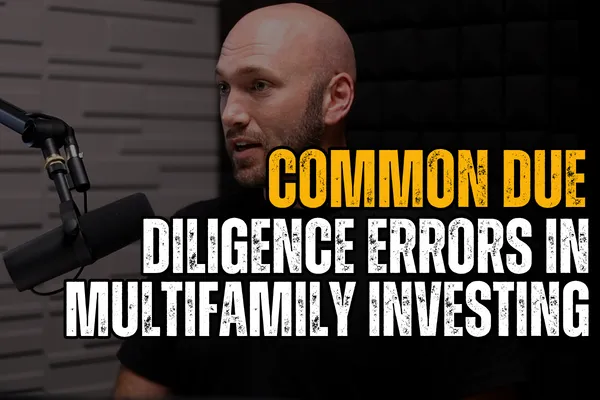Ben Lovro Blogs
AI' Client Conversion Framework

Common Due Diligence Errors in Multifamily Investing
Introduction
Investing in multifamily properties can be a lucrative venture, offering a unique blend of cash flow, scalability, and relative stability. However, due diligence is a pivotal component of the investment process that, if not conducted meticulously, can lead to costly mistakes. Common oversights during due diligence can undermine the potential benefits of multifamily investing.

1. Underestimating the Importance of Location
The location of a property plays a pivotal role in its success. This is not merely about its physical coordinates, but also about the surrounding environment, community, and market. Ignoring these factors can lead to undesirable outcomes.
A prime location can drive higher demand, rental income, and property appreciation. Conversely, an unfavorable location may result in vacancy issues and decreased property value. Therefore, understanding the importance of location, conducting thorough market research, and considering the local context are essential steps in making informed and profitable real estate investments.
2. Neglecting Property Inspections
Neglecting property inspections can have far-reaching consequences. These assessments, while often overlooked, are crucial for both homeowners and prospective buyers. Skipping property inspections can lead to unexpected issues, such as hidden structural defects, plumbing problems, or electrical issues, which can result in substantial repair costs down the line.
In addition to financial implications, neglecting inspections can compromise safety. Faulty wiring or weak foundations can pose serious hazards.
Therefore, it's advisable for homeowners and buyers alike to prioritize property inspections. By doing so, they can ensure the integrity of the property, avoid costly surprises, and maintain a safe and sound living environment.
3. Overlooking Tenant Quality and Lease Terms
Real estate investments, overlooking tenant quality and lease terms can be a costly mistake. Ensuring that you have reliable and responsible tenants is essential for the long-term success of your investment property.
Tenant quality goes beyond just the ability to pay rent; it involves their track record of maintaining the property and adhering to lease terms. Additionally, lease terms must be carefully crafted to protect your interests and outline clear expectations.
Failing to pay attention to these aspects can lead to financial setbacks and legal issues down the road. Therefore, it's crucial to conduct thorough tenant screenings and create well-defined lease agreements to safeguard your real estate investment.
4. Misjudging Operating Expenses
Misjudging operating expenses can be a critical pitfall for businesses. It's akin to navigating a treacherous path with a blindfold on. Accurate financial planning is essential for sustainable growth, but misjudging expenses can lead to financial instability. This can happen when businesses underestimate costs like rent, utilities, salaries, or inventory. Such miscalculations can strain cash flow and hinder the ability to invest in expansion or innovation.
To avoid this, meticulous budgeting and regular financial assessments are imperative. It's vital to account for unforeseen circumstances and prioritize financial prudence. In the world of business, a sound understanding of operating expenses can be the difference between success and stagnation.
5. Disregarding Legal and Zoning Issues
This oversight can lead to significant legal complications and financial losses. Legal due diligence involves ensuring that the property adheres to all local zoning laws, which dictate the permissible uses of the property. It's crucial for investors to verify that the property's current use aligns with these regulations, as non-compliance can result in costly legal battles, fines, or even the forced alteration or cessation of property use.
Investors should conduct a thorough title search to uncover any liens, easements, or encumbrances that could affect ownership rights or future development plans. Consultation with a real estate attorney is advisable to navigate these complex legal waters.
Ignoring these legal and zoning issues can derail an otherwise sound investment, turning what seems like a lucrative opportunity into a financial quagmire. Therefore, a meticulous approach to legal due diligence is not just prudent; it's essential in safeguarding one's investment from unexpected legal entanglements.
6. Overlooking Capital Expenditure Requirements
A critical but often overlooked aspect is the accurate assessment of capital expenditure (CapEx) requirements. Capital expenditures refer to significant funds used to purchase, upgrade, or maintain physical assets such as buildings and equipment. This aspect is pivotal as it directly impacts the long-term sustainability and profitability of an investment.
Many investors, particularly novices, tend to focus primarily on immediate operational costs and potential revenue, neglecting the future expenses associated with substantial property improvements or repairs. Such oversights can lead to a significant underestimation of the property's overall financial requirements, thereby skewing the expected return on investment. It’s essential to factor in the costs of major renovations, such as roof replacements or HVAC system overhauls, as these can be substantial.
A comprehensive understanding and provision for CapEx in the investment plan ensure that the property remains in optimal condition, enhancing its value and appeal to tenants. This proactive approach not only mitigates the risk of unexpected financial strains but also ensures the longevity and success of the multifamily property as a viable investment.
7. Analyze Inadequate Market
This crucial aspect often gets overlooked, leading to misinformed investment decisions. A comprehensive market analysis goes beyond superficial data, delving into the nuances of the local rental market, including average occupancy rates, rental price trends, and demographic shifts. It's not just about understanding the current market status but also forecasting future changes.
Investors who fail to conduct a detailed market analysis might miss critical insights, such as upcoming economic developments that could influence rental demand or shifts in the local population that might affect the types of units in demand. Moreover, relying on generalized market information instead of data specific to the property's locality can lead to skewed perceptions of a property’s potential.
This step is crucial for aligning investment strategies with real market conditions and avoiding pitfalls that come from basing decisions on incomplete or inaccurate information. Therefore, investors should prioritize a thorough market analysis to ensure their investment aligns with actual market dynamics and is positioned for long-term success.
8. Failing to Plan for Management
This oversight is particularly critical as property management encompasses a wide range of responsibilities, from tenant screening and lease management to maintenance, repairs, and handling legal complexities. When investors neglect this facet, they either underestimate the time and expertise required to manage the property effectively or fail to account for the costs and quality of professional property management services.
The choice between self-management and hiring a property management company should be a strategic decision, not an afterthought. Self-management can be time-consuming and challenging, especially for those who lack experience in real estate. On the other hand, while hiring a management company adds to the operating costs, it brings professional expertise, potentially leading to better tenant retention and smoother property operations.
Thus, planning for management is not just a logistical step but a crucial element in shaping the investment’s profitability and sustainability. By giving due importance to this aspect, investors can enhance their ability to respond to tenant needs, maintain property standards, and ensure consistent revenue generation.
9. Not Accounting for Economic Vacancy
This term extends beyond the mere presence of tenants in a property. Economic vacancy refers to the gap between the actual income generated and the potential income if the property were fully leased at market rates. This discrepancy arises not just from unoccupied units, but also from rent defaults, concessions, and below-market rents.
Astute investors understand that a property can be fully occupied yet still suffer from high economic vacancy if many tenants are delinquent on rent or if rental rates are significantly lower than the market average. Overlooking this can lead to a skewed perception of the property’s financial health. In essence, economic vacancy is a more nuanced and telling indicator of a property’s performance, underscoring the income it genuinely produces versus its full potential.
Acknowledging and accounting for economic vacancy in the due diligence process is vital for a realistic appraisal of the investment's profitability and long-term viability. It prompts investors to consider not just the quantity of tenants, but also the quality of tenancy and rental agreements, ensuring a more accurate projection of the property’s revenue-generating capabilities.
Conclusion
Due diligence in multifamily investing is a meticulous process that demands attention to detail. From the fundamentals of location and property inspections to the intricacies of leases, expenses, legalities, and market dynamics, each aspect requires careful consideration. Common due diligence errors, as outlined above, can be costly but are avoidable with a comprehensive approach. By acknowledging and addressing these potential pitfalls, investors can position themselves to make more informed decisions, leading to successful multifamily property investments.
Remember, due diligence is not merely a step in the investment process; it's a protective measure that ensures the sustainability and growth of your multifamily investment venture.
Contact Us

Bet On Yourself
Empowering entrepreneurs and real estate investors with the tools they need to scale.
ben@clientpro.ai
(803) 921-9915
100 Old Cherokee Road ste f 342





